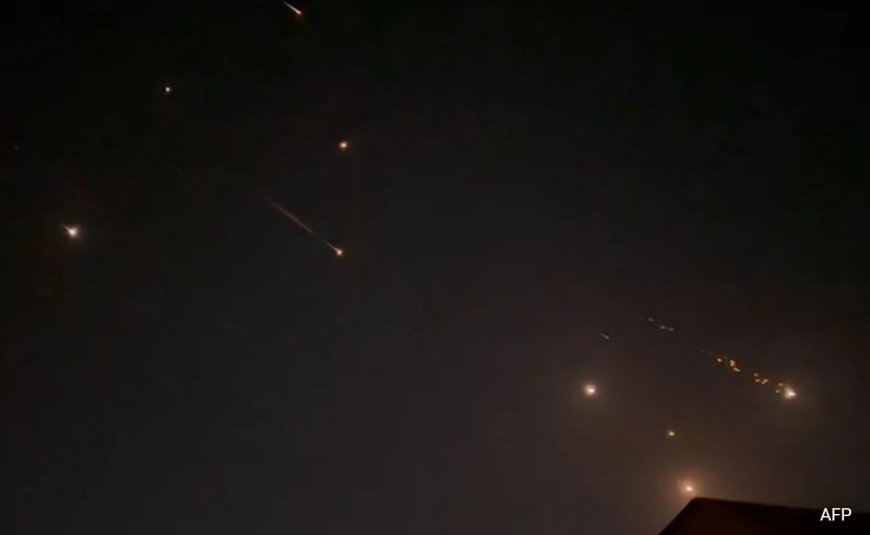Iran Says It Has Finished Attack On Israel Amid Fears Of Spreading Conflict
Iran said early on Wednesday that its missile attack on Israel was finished barring further provocation, while Israel and the U.S. promised to retaliate against Tehran's escalation as fears of a wider war intensified.

an said early on Wednesday that its missile attack on Israel was finished barring further provocation, while Israel and the U.S. promised to retaliate against Tehran's escalation as fears of a wider war intensified.
Washington said it would work with longtime ally Israel to make sure Iran faced "severe consequences" for Tuesday's attack.
The United Nations Security Council scheduled a meeting about the Middle East for Wednesday, and the European Union called for an immediate ceasefire.
"Our action is concluded unless the Israeli regime decides to invite further retaliation. In that scenario, our response will be stronger and more powerful," Iranian Foreign Minister Abbas Araqchi said in a post on X early on Wednesday.
Israel early on Wednesday renewed its bombardment of Beirut's southern suburbs, a Hezbollah stronghold, with at least three strikes against what it said were targets belonging the group.
Large smoke plumes seen rising from parts of the suburbs. Israel issued new evacuation orders for the area, which have largely emptied after days of heavy strikes.
In its biggest ever military blow against Israel, Iran fired more than 180 ballistic missiles on Tuesday, according to Israel. Sirens sounded across the country and explosions rattled Jerusalem and the Jordan River valley as the entire population was told to seek shelter in bomb shelters.
No injuries were reported in Israel, but one man was killed in the occupied West Bank, authorities there said.
Iran described the campaign as defensive and solely aimed at Israeli military facilities. Iran's state news agency said three Israeli military bases had been targeted.
Tehran said its attack was responding to Israeli killings of militant leaders and aggression in Lebanon against the Iran-backed armed movement Hezbollah and in Gaza.
Israel activated air defences against Iran's bombardment and most missiles were intercepted "by Israel and a defensive coalition led by the United States," Israeli Rear Admiral Daniel Hagari said in a video on X, adding: "Iran's attack is a severe and dangerous escalation."
Israeli Prime Minister Benjamin Netanyahu vowed to hit back. "Iran made a big mistake tonight - and it will pay for it," Netanyahu said at the outset of an emergency political-security cabinet meeting late on Tuesday, according to a statement.
Any Israeli response to Tuesday's missile attack would be met with "vast destruction" of Israeli infrastructure, Iran's General Staff of the Armed Forces said in a statement carried by state media, also promising to target regional assets of any Israeli ally that got involved.
Fears that Iran and the U.S. would be drawn into a regional war have risen with Israel's growing assault on Lebanon in the past two weeks, including the start of a ground operation there on Monday, and its year-old conflict in the Gaza Strip.
Iran's forces on Tuesday used hypersonic Fattah missiles for the first time, and 90% of its missiles successfully hit their targets in Israel, the Revolutionary Guards said.
Israel's Hagari said central and southern Israel received limited strikes. A video released by the military showed a school in the central city of Gadera heavily damaged by an Iranian missile.
U.S. Navy warships fired about a dozen interceptors against Iranian missiles headed toward Israel, the Pentagon said. Britain said its forces played a part "in attempts to prevent further escalation in the Middle East" without elaborating.
U.S. President Joe Biden expressed full U.S. support for Israel and described Iran's attack as "ineffective." Vice President Kamala Harris, the Democratic candidate for U.S. president, backed Biden's stance and said the U.S. would not hesitate to defend its interests against Iran.
"We will act. Iran will soon feel the consequences of their actions. The response will be painful," Israel's U.N. Ambassador Danny Danon told reporters.
U.S. DOES NOT URGE RESTRAINT
The White House similarly promised "severe consequences" for Iran and spokesman Jake Sullivan told a Washington briefing the U.S. would "work with Israel to make that the case."
Sullivan did not specify what those consequences might be, but he stopped short of urging restraint by Israel as the U.S. did in April when Iran carried out a drone and missile attack on Israel. The Pentagon said Tuesday's airstrikes by Iran were about twice the size of April's assault.
U.N. Secretary-General Antonio Guterres condemned what he called "escalation after escalation", saying: "This must stop. We absolutely need a ceasefire."
EU foreign policy chief Josep Borrell also called for an immediate regional ceasefire. "The dangerous cycle of attacks and retaliation risks ... spiralling out of control," he posted on X.
British Prime Minister Keir Starmer spoke with the leaders of Germany and France, and they agreed on a need for restraint from all sides, Downing Street said.
Nearly 1,900 people have been killed and more than 9,000 wounded in Lebanon in almost a year of cross-border fighting, most in the past two weeks, according to Lebanese government statistics on Tuesday.
(Except for the headline, this story has not been edited by NDTV staff and is published from a syndicated feed.)
What's Your Reaction?





















































